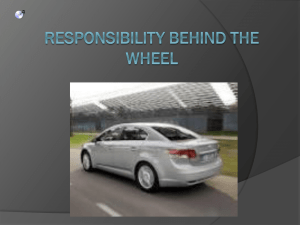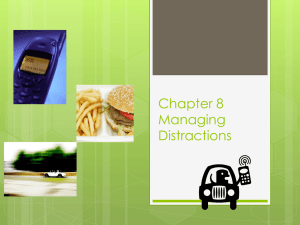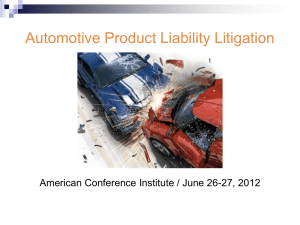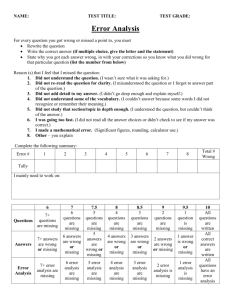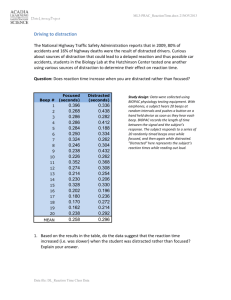distractive-driver-power
advertisement
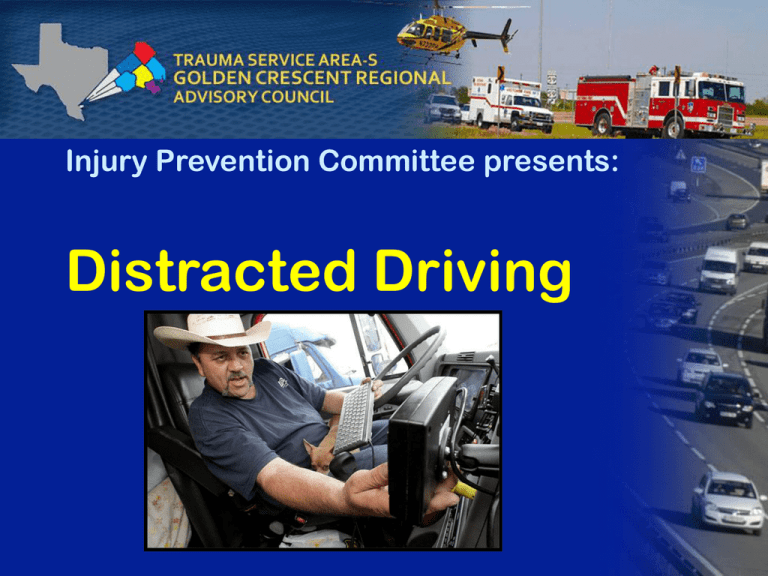
Injury Prevention Committee presents: Distracted Driving Distracted Drivers, People are dying to get your attention!!! What is distracted Driving? According to Distraction.gov, distracted driving is defined as : “any non-driving activity a person engages in that has the potential to distract him or her from the primary task of driving and increase the risk of crashing.” Driving is a skill that requires your full attention to safely control your vehicle and respond to events happening around you. Distractions are anything that takes your attention off the primary task of driving. Types of Distractions: There are 3 types of distractions: Visual Distractions: Anything that takes your eyes off the road. Manual Distractions: Anything that takes your hands off the steering wheel. Cognitive Distractions: Anything that takes your mind off driving. Distractions: All distractions can be dangerous and life threatening but texting is one of the most dangerous distractions because it involves all three types of distractions. Other distractive activities include: » » » » » » » » Using a cell phone Eating and drinking Talking to passengers Grooming Reading, including map Using PDA or navigation system Watching a videa Changing the radio station, CD, Mp3 player or other device • 20% of injury crashes in 2009 involved reports of distracted driving. • Of those killed in distracted-driving-related crashes, 995 involved reports of a cell phone as a distraction (18% of fatalities in distractionrelated crashes). (NHTSA) • In 2009, 5,474 people were killed in U.S. roadways and an estimated 448,000 were injured in motor vehicle crashes that were reported to have involved distracted driving (FARS and GES) • The age group with the greatest proportion of distracted drivers was the under-20 age group– 16% of all drivers younger than 20 involved in fatal crashes were reported to have been distracted while driving. (NHTSA) • Drivers who use hand-held devices are four times as likely to get into crashes serious enough to injure themselves. (Source: Insurance Institute for Highway Safety) • Using a cell phone while driving, whether it’s hand-held or hands-free, delays a driver’s reactions as much as having a blood alcohol concentration at the legal limit of .08%. (Source: University of Utah) • 80% of all crashes and 65% of near crashes involve some type of distraction (Virginia Tech 100-car Study for the NHTSA) • Brain activity used while driving decreases by 40% when a driver listens to conversation or music. (Center for Cognitive Brain Imaging a Carnegie Mellon University) • More than 80% of drivers admit to blatantly hazardous behavior.: Changing clothes, steering with a foot, painting nails, and shaving What can I do to reduce my risk of distraction? Being a Undistracted Driver is the safest way to drive!!! When drivers are undistracted, they are able to stay focused in the roadway and are aware of behaviors of other drivers on the road. These drivers stay focused, pay attention, and expect the unexpected. Tips to help you drive safer: • Ensure all passengers are buckled-up properly. • Be well-rested and in the appropriate mindset to drive. Driving when upset or angry can be just as dangerous as driving while tired. • Identify and reduce all distractions before driving. • Do not tailgate. • Allow sufficient time to reach your destination. • Ensure your vehicle is properly maintained. • Put your cell phone on silent or turn it off and put it out or reach. If someone calls, call them back when you safely reach your destination. • Put your makeup on before you leave the house or at your destination. Don’t brush or comb your hair or shave while driving. • When you’re on the road, keep your eyes on the road and your hands on the steering wheel. • Avoid eating while driving. • Do not read a book or check your email in the car. • Do not be distracted by the passengers in the car. Additional information on Distracted Driving: • Distraction.Gov: http://www.distraction.gov/ • National Safety Council: http://www.nsc.org/safety_road/distracted_driving/pages/distracted_driving.aspx • Nationwide Insurance: http://www.nationwide.com/newsroom/dwd-facts-figures.jsp • Geico Insurance: http://www.geico.om/information/safety/auto/teendriving/distracted-driving/ • Focus Driven: http://www.focusdriven.org/index.aspx • Federal Communications Commission: http://www.fcc.gov/cgb/driving.html • The Oprah Show: http://www.oprah.com/oprahshow/End-Distracted-Driving • Remember Alex Brown (R.A.B): http://www.rememberalexbrownfoundation.org/index.php STOP DRIVING AND TEXTING! TURN OFF THE PHONE AND DRIVE!!! REMEMBER… The life you save could be your own!
